- Home
- Albert Camus
The Fall Page 5
The Fall Read online
Page 5
But here we are; here’s my house, my shelter! Tomorrow? Yes, if you wish. I’d like to take you to the island of Marken so you can see the Zuider Zee. Let’s meet at eleven at Mexico City. What? That woman? Oh, I don’t know. Really I don’t know. The next day, and the days following, I didn’t read the papers.
A DOLL’S village, isn’t it? No shortage of quaintness here! But I didn’t bring you to this island for quaintness, cher ami. Anyone can show you peasant headdresses, wooden shoes, and ornamented houses with fishermen smoking choice tobacco surrounded by the smell of furniture wax. I am one of the few people, on the other hand, who can show you what really matters here.
We are reaching the dike. We’ll have to follow it to get as far as possible from these too charming houses. Please, let’s sit down. Well, what do you think of it? Isn’t it the most beautiful negative landscape? Just see on the left that pile of ashes they call a dune here, the gray dike on the right, the livid beach at our feet, and in front of us, the sea the color of a weak lye-solution with the vast sky reflecting the colorless waters. A soggy hell, indeed! Everything horizontal, no relief; space is colorless, and life dead. Is it not universal obliteration, everlasting nothingness made visible? No human beings, above all, no human beings! You and I alone facing the planet at last deserted! The sky is alive? You are right, cher ami. It thickens, becomes concave, opens up air shafts and closes cloudy doors. Those are the doves. Haven’t you noticed that the sky of Holland is filled with millions of doves, invisible because of their altitude, which flap their wings, rise or fall in unison, filling the heavenly space with dense multitudes of grayish feathers carried hither and thither by the wind? The doves wait up there all year round. They wheel above the earth, look down, and would like to come down. But there is nothing but the sea and the canals, roofs covered with shop signs, and never a head on which to light.
You don’t understand what I mean? I’ll admit my fatigue. I lose the thread of what I am saying; I’ve lost that lucidity to which my friends used to enjoy paying respects. I say “my friends,” moreover, as a convention. I have no more friends; I have nothing but accomplices. To make up for this, their number has increased; they are the whole human race. And within the human race, you first of all. Whoever is at hand is always the first. How do I know I have no friends? It’s very easy: I discovered it the day I thought of killing myself to play a trick on them, to punish them, in a way. But punish whom? Some would be surprised, and no one would feel punished. I realized I had no friends. Besides, even if I had had, I shouldn’t be any better off. If I had been able to commit suicide and then see their reaction, why, then the game would have been worth the candle. But the earth is dark, cher ami, the coffin thick, and the shroud opaque. The eyes of the soul—to be sure—if there is a soul and it has eyes! But you see, we’re not sure, we can’t be sure. Otherwise, there would be a solution; at least one could get oneself taken seriously. Men are never convinced of your reasons, of your sincerity, of the seriousness of your sufferings, except by your death. So long as you are alive, your case is doubtful; you have a right only to their skepticism. So if there were the least certainty that one could enjoy the show, it would be worth proving to them what they are unwilling to believe and thus amazing them. But you kill yourself and what does it matter whether or not they believe you? You are not there to see their amazement and their contrition (fleeting at best), to witness, according to every man’s dream, your own funeral. In order to cease being a doubtful case, one has to cease being, that’s all.
Besides, isn’t it better thus? We’d suffer too much from their indifference. “You’ll pay for this!” a daughter said to her father who had prevented her from marrying a too well groomed suitor. And she killed herself. But the father paid for nothing. He loved fly-casting. Three Sundays later he went back to the river—to forget, as he said. He was right; he forgot. To tell the truth, the contrary would have been surprising. You think you are dying to punish your wife and actually you are freeing her. It’s better not to see that. Besides the fact that you might hear the reasons they give for your action. As far as I am concerned, I can hear them now: “He killed himself because he couldn’t bear …” Ah, cher ami, how poor in invention men are! They always think one commits suicide for a reason. But it’s quite possible to commit suicide for two reasons. No, that never occurs to them. So what’s the good of dying intentionally, of sacrificing yourself to the idea you want people to have of you? Once you are dead, they will take advantage of it to attribute idiotic or vulgar motives to your action. Martyrs, cher ami, must choose between being forgotten, mocked, or made use of. As for being understood—never!
Besides, let’s not beat about the bush; I love life—that’s my real weakness. I love it so much that I am incapable of imagining what is not life. Such avidity has something plebeian about it, don’t you think? Aristocracy cannot imagine itself without a little distance surrounding itself and its life. One dies if necessary, one breaks rather than bending. But I bend, because I continue to love myself. For example, after all I have told you, what do you think I developed? An aversion for myself? Come, come, it was especially with others that I was fed up. To be sure, I knew my failings and regretted them. Yet I continued to forget them with a rather meritorious obstinacy. The prosecution of others, on the contrary, went on constantly in my heart. Of course—does that shock you? Maybe you think it’s not logical? But the question is not to remain logical. The question is to slip through and, above all—yes, above all, the question is to elude judgment. I’m not saying to avoid punishment, for punishment without judgment is bearable. It has a name, besides, that guarantees our innocence: it is called misfortune. No, on the contrary, it’s a matter of dodging judgment, of avoiding being forever judged without ever having a sentence pronounced.
But one can’t dodge it so easily. Today we are always ready to judge as we are to fornicate. With this difference, that there are no inadequacies to fear. If you doubt this, just listen to the table conversation during August in those summer hotels where our charitable fellow citizens take the boredom cure. If you still hesitate to conclude, read the writings of our great men of the moment. Or else observe your own family and you will be edified. Mon cher ami, let’s not give them any pretext, no matter how small, for judging us! Otherwise, we’ll be left in shreds. We are forced to take the same precautions as the animal tamer. If, before going into the cage, he has the misfortune to cut himself while shaving, what a feast for the wild animals! I realized this all at once the moment I had the suspicion that maybe I wasn’t so admirable. From then on, I became distrustful. Since I was bleeding slightly, there was no escape for me; they would devour me.
My relations with my contemporaries were apparently the same and yet subtly out of tune. My friends hadn’t changed. On occasion, they still extolled the harmony and security they found in my company. But I was aware only of the dissonances and disorder that filled me; I felt vulnerable and open to public accusation. In my eyes my fellows ceased to be the respectful public to which I was accustomed. The circle of which I was the center broke and they lined up in a row as on the judges’ bench. In short, the moment I grasped that there was something to judge in me, I realized that there was in them an irresistible vocation for judgment. Yes, they were there as before, but they were laughing. Or rather it seemed to me that every one I encountered was looking at me with a hidden smile. I even had the impression, at that time, that people were tripping me up. Two or three times, in fact, I stumbled as I entered public places. Once, even, I went sprawling on the floor. The Cartesian Frenchman in me didn’t take long to catch hold of himself and attribute those accidents to the only reasonable divinity—that is, chance. Nonetheless, my distrust remained.
Once my attention was aroused, it was not hard for me to discover that I had enemies. In my profession, to begin with, and also in my social life. Some among them I had obliged. Others I should have obliged. All that, after all, was natural, and I discovered it without too much
grief. It was harder and more painful, on the other hand, to admit that I had enemies among people I hardly knew or didn’t know at all. I had always thought, with the ingenuousness I have already illustrated to you, that those who didn’t know me couldn’t resist liking me if they came to know me. Not at all! I encountered hostility especially among those who knew me only at a distance without my knowing them myself. Doubtless they suspected me of living fully, given up completely to happiness; and that cannot be forgiven. The look of success, when it is worn in a certain way, would infuriate a jackass. Then again, my life was full to bursting, and for lack of time, I used to refuse many advances. Then I would forget my refusals, for the same reason. But those advances had been made me by people whose lives were not full and who, for that very reason, would remember my refusals.
Thus it is that in the end, to take but one example, women cost me dear. The time I used to devote to them I couldn’t give to men, who didn’t always forgive me this. Is there any way out? Your successes and happiness are forgiven you only if you generously consent to share them. But to be happy it is essential not to be too concerned with others. Consequently, there is no escape. Happy and judged, or absolved and wretched. As for me, the injustice was even greater: I was condemned for past successes. For a long time I had lived in the illusion of a general agreement, whereas, from all sides, judgments, arrows, mockeries rained upon me, inattentive and smiling. The day I was alerted I became lucid; I received all the wounds at the same time and lost my strength all at once. The whole universe then began to laugh at me.
That is what no man (except those who are not really alive—in other words, wise men) can endure. Spitefulness is the only possible ostentation. People hasten to judge in order not to be judged themselves. What do you expect? The idea that comes most naturally to man, as if from his very nature, is the idea of his innocence. From this point of view, we are all like that little Frenchman at Buchenwald who insisted on registering a complaint with the clerk, himself a prisoner, who was recording his arrival. A complaint? The clerk and his comrades laughed: “Useless, old man. You don’t lodge a complaint here.” “But you see, sir,” said the little Frenchman, “My case is exceptional. I am innocent!”
We are all exceptional cases. We all want to appeal against something! Each of us insists on being innocent at all cost, even if he has to accuse the whole human race and heaven itself. You won’t delight a man by complimenting him on the efforts by which he has become intelligent or generous. On the other hand, he will beam if you admire his natural generosity. Inversely, if you tell a criminal that his crime is not due to his nature or his character but to unfortunate circumstances, he will be extravagantly grateful to you. During the counsel’s speech, this is the moment he will choose to weep. Yet there is no credit in being honest or intelligent by birth. Just as one is surely no more responsible for being a criminal by nature than for being a criminal by circumstance. But those rascals want grace, that is irresponsibility, and they shamelessly allege the justifications of nature or the excuses of circumstances, even if they are contradictory. The essential thing is that they should be innocent, that their virtues, by grace of birth, should not be questioned and that their misdeeds, born of a momentary misfortune, should never be more than provisional. As I told you, it’s a matter of dodging judgment. Since it is hard to dodge it, tricky to get one’s nature simultaneously admired and excused, they all strive to be rich. Why? Did you ever ask yourself? For power, of course. But especially because wealth shields from immediate judgment, takes you out of the subway crowd to enclose you in a chromium-plated automobile, isolates you in huge protected lawns, Pullmans, first-class cabins. Wealth, cher ami, is not quite acquittal, but reprieve, and that’s always worth taking.
Above all, don’t believe your friends when they ask you to be sincere with them. They merely hope you will encourage them in the good opinion they have of themselves by providing them with the additional assurance they will find in your promise of sincerity. How could sincerity be a condition of friendship? A liking for truth at any cost is a passion that spares nothing and that nothing resists. It’s a vice, at times a comfort, or a selfishness. Therefore, if you are in that situation, don’t hesitate: promise to tell the truth and then lie as best you can. You will satisfy their hidden desire and doubly prove your affection.
This is so true that we rarely confide in those who are better than we. Rather, we are more inclined to flee their society. Most often, on the other hand, we confess to those who are like us and who share our weaknesses. Hence we don’t want to improve ourselves or be bettered, for we should first have to be judged in default. We merely wish to be pitied and encouraged in the course we have chosen. In short, we should like, at the same time, to cease being guilty and yet not to make the effort of cleansing ourselves. Not enough cynicism and not enough virtue. We lack the energy of evil as well as the energy of good. Do you know Dante? Really? The devil you say! Then you know that Dante accepts the idea of neutral angels in the quarrel between God and Satan. And he puts them in Limbo, a sort of vestibule of his Hell. We are in the vestibule, cher ami.
Patience? You are probably right. It would take patience to wait for the Last Judgment. But that’s it, we’re in a hurry. So much in a hurry, indeed, that I was obliged to make myself a judge-penitent. However, I first had to make shift with my discoveries and put myself right with my contemporaries’ laughter. From the evening when I was called—for I was really called—I had to answer or at least seek an answer. It wasn’t easy; for some time I floundered. To begin with, that perpetual laugh and the laughers had to teach me to see clearly within me and to discover at last that I was not simple. Don’t smile; that truth is not so basic as it seems. What we call basic truths are simply the ones we discover after all the others.
However that may be, after prolonged research on myself, I brought out the fundamental duplicity of the human being. Then I realized, as a result of delving in my memory, that modesty helped me to shine, humility to conquer, and virtue to oppress. I used to wage war by peaceful means and eventually used to achieve, through disinterested means, everything I desired. For instance, I never complained that my birthday was overlooked; people were even surprised, with a touch of admiration, by my discretion on this subject. But the reason for my disinterestedness was even more discreet: I longed to be forgotten in order to be able to complain to myself. Several days before the famous date (which I knew very well) I was on the alert, eager to let nothing slip that might arouse the attention and memory of those on whose lapse I was counting (didn’t I once go so far as to contemplate falsifying a friend’s calendar?). Once my solitude was thoroughly proved, I could surrender to the charms of a virile self-pity.
Thus the surface of all my virtues had a less imposing reverse side. It is true that, in another sense, my shortcomings turned to my advantage. For example, the obligation I felt to conceal the vicious part of my life gave me a cold look that was confused with the look of virtue; my indifference made me loved; my selfishness wound up in my generosities. I stop there, for too great a symmetry would upset my argument. But after all, I presented a harsh exterior and yet could never resist the offer of a glass or of a woman! I was considered active, energetic, and my kingdom was the bed. I used to advertise my loyalty and I don’t believe there is a single person I loved that I didn’t eventually betray. Of course, my betrayals didn’t stand in the way of my fidelity; I used to knock off a considerable pile of work through successive periods of idleness; and I had never ceased aiding my neighbor, thanks to my enjoyment in doing so. But however much I repeated such facts to myself, they gave me but superficial consolations. Certain mornings, I would get up the case against myself most thoroughly, coming to the conclusion that I excelled above all in scorn. The very people I helped most often were the most scorned. Courteously, with a solidarity charged with emotion, I used to spit daily in the face of all the blind.
Tell me frankly, is there any excuse for that? There is one, but s
o wretched that I cannot dream of advancing it. In any case, here it is: I have never been really able to believe that human affairs were serious matters. I had no idea where the serious might lie, except that it was not in all this I saw around me—which seemed to me merely an amusing game, or tiresome. There are really efforts and convictions I have never been able to understand. I always looked with amazement, and a certain suspicion, on those strange creatures who died for money, fell into despair over the loss of a “position,” or sacrificed themselves with a high and mighty manner for the prosperity of their family. I could better understand that friend who had made up his mind to stop smoking and through sheer will power had succeeded. One morning he opened the paper, read that the first H-bomb had been exploded, learned about its wonderful effects, and hastened to a tobacco shop.
To be sure, I occasionally pretended to take life seriously. But very soon the frivolity of seriousness struck me and I merely went on playing my role as well as I could. I played at being efficient, intelligent, virtuous, civic-minded, shocked, indulgent, fellow-spirited, edifying … In short, there’s no need of going on, you have already grasped that I was like my Dutchmen who are here without being here: I was absent at the moment when I took up the most space. I have never been really sincere and enthusiastic except when I used to indulge in sports, and in the army, when I used to act in plays we put on for our own amusement. In both cases there was a rule of the game, which was not serious but which we enjoyed taking as if it were. Even now, the Sunday matches in an overflowing stadium, and the theater, which I loved with the greatest passion, are the only places in the world where I feel innocent.

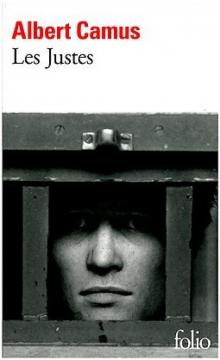 Les Justes
Les Justes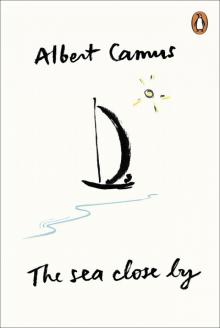 The Sea Close By
The Sea Close By The Stranger
The Stranger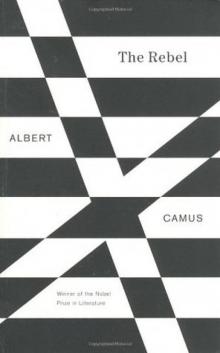 The Rebel: An Essay on Man in Revolt
The Rebel: An Essay on Man in Revolt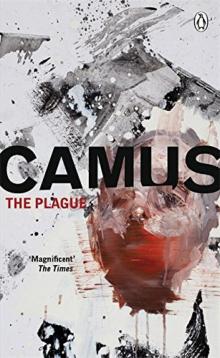 The plague
The plague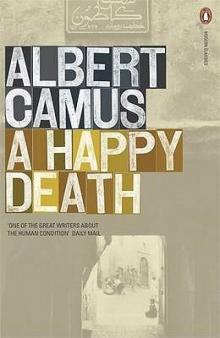 A Happy Death
A Happy Death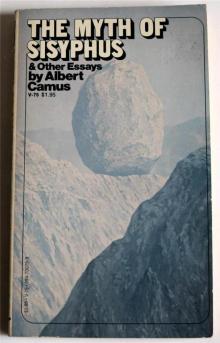 The Myth of Sisyphus and Other Essays
The Myth of Sisyphus and Other Essays The Fall
The Fall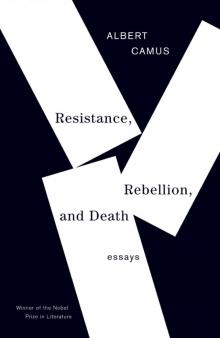 Resistance, Rebellion, and Death
Resistance, Rebellion, and Death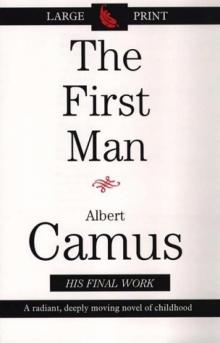 The First Man
The First Man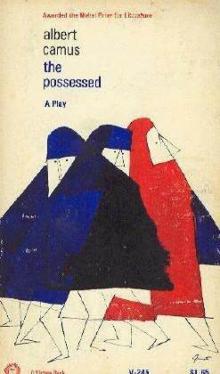 The Possessed
The Possessed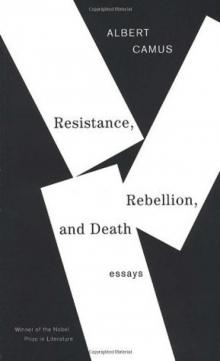 Resistance, Rebellion and Death: Essays
Resistance, Rebellion and Death: Essays